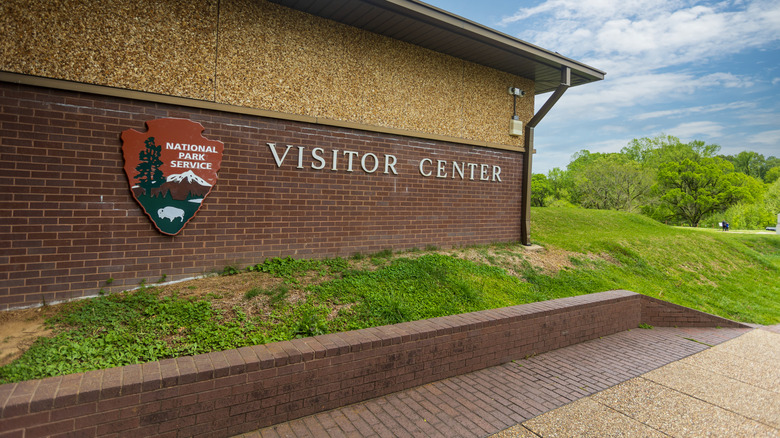You May Have Committed A Federal Crime In A US National Park Without Even Realizing It
National parks within the US have rules and restrictions in place to protect the great outdoors and the people enjoying it. Some of these rules dictate how long you can stay at a park's campsite while some parks require reservations to manage crowds. Other parks, like the Sequoia & Kings Canyon National Parks, present more obscure regulations, like the no shortcuts rule. When visitors are unaware of these and other guidelines, it's easier for them to commit a crime in federal lands — unintentionally, of course.
Any violation of federal laws or park regulations often involves actions that harm the park's environment, wildlife, cultural resources, or endanger other visitors. Common violations include unauthorized hunting or fishing, disturbing or harming the local wildlife, littering, or ignoring camping regulations. Visitors to national parks should always look into the rules and regulations established by park authorities to avoid any mishap, as violations do have serious legal consequences, as you probably already guessed.
These consequences can range from federal charges and fines, to being placed under probation, or even imprisonment, depending on the offense. Once again, in order to avoid breaking the law while visiting national parks, educating yourself is essential. To help you in this endeavor, here's a small list of crimes you (or someone you know) may have unknowingly committed while visiting these federal lands.
Disturbing or harming wildlife and ignoring fishing regulations
A visit to America's national parks are sure to result in wildlife encounters. Some of these parks almost guarantee you come close to bears and other animals like bison or even wolves. As such, many visitors are tempted to try to interact with local wildlife without knowing that it's not only forbidden, but sometimes even illegal. One completely illegal interaction is feeding wildlife, as it can change behavioral patterns in species and make them too comfortable with humans, further endangering animals that could already be on the brink of extinction or facing other threats.
A lesser known interaction with wildlife that violates the Code of Federal Regulations Title 36 § 2.2 (Wildlife Protection) is imitating the calls and sounds of a park's species. That regulation outlaws feeding, touching, and disturbing wild animals, as well. For instance, Yellowstone has a "no howling" rule to protect its wolves. Any action that disturbs, harms, or scares wild animals is punishable by law. In some parks, it is legal to bring a pet, but in those cases, you must keep your pet on a leash and under supervision at all times. Just something to consider if traveling with your furry companion. Poaching is also illegal, or hunting and fishing outside of the established regulations, so be sure to know the rules where you are planning to hunt or fish.
As for fishing regulations, every park has its own set of rules. However, most of them require anglers to implement "catch-and-release" practices while others ask that you dispose of the remains of any fish you caught, cooked, and ate in designated locations to avoid polluting swimming waters, rivers, lakes, etc. Any breach of these rules can indeed be considered a federal offense.
Trespassing, vandalism, and arson
It should be obvious, but trespassing on national parks — which are federal property — is considered a crime. It is a violation of federal regulations and statutes designed to protect national park resources and ensure public safety. You might be wondering if it's even possible to trespass on a national park, but indeed it is. For example, if an area's access is closed for any reason, ignoring said closure is considered trespassing. A more obvious example would be if the whole park is closed for visitors and you still decide to enter.
On that same line, damaging the landscape, trees, rocks, or any other natural asset, as well as parks' facilities and various sites, is also penalized as vandalism. Once again, please check with a park's authorities as soon as you enter the park, as sometimes even riding a bike on unauthorized trails can be considered vandalism due to it potentially harming the landscape.
Setting an intentional fire to a national park — meaning arson — must be avoided. These actions, as well as lighting campfires in restricted or unauthorized areas, can cause significant damage to the environment, threaten public safety, and disrupt recreational activities within the park. Arson violations can result in hefty fines and even years in imprisonment. To avoid fire-induced tragedies, national parks issue fire bans periodically, which should be followed every time they are in place. Fortunately, there are several safe campfire alternatives you can use when visiting national parks.
Illegal camping practices, misuse of trails and littering, and other offenses
Setting up camp in unauthorized areas is also a crime. Some parks don't even allow camping at all, so breaking these rules is another federal offense. Other crimes you might be unknowingly committing while camping include bathing in unauthorized bodies of water as well as washing your clothes or dishes in them.
Speaking of designated areas, many national parks allow hiking only on specific trails. Straying off of them can also result in an offense. Blocking or obstructing authorized trails is also illegal. Illegal parking has also become an issue in places like Joshua Tree National Park, so please avoid any of these actions to avoid endangering yourself or others.
Littering in national parks is illegal as well. Litter can take decades to decompose, polluting soil and water and harming plant life, so it's a common regulation you need to follow within national parks — with penalties for violating it. If there are no trash containers to be found, pack your garbage and take it back with you. Finally, driving under the influence within a park's grounds, as well as having illegal drugs in your possession, can also result in federal charges against you.
How to avoid committing a crime in national parks
As intimidating as this list might sound, it is actually pretty easy to avoid committing any crimes on federal land. It all comes down to familiarizing yourself with park regulations and adhering to them, including those related to wildlife, trails, and camping. The National Parks Service website has some great resources for you to get acquainted with. However, it is important to note that each particular park might have its own set of rules and regulations.
For example, the Guadalupe Mountains National Park doesn't allow pets within its grounds — not even while on a leash. It also doesn't allow for campfires. It is important for you to either stop by each park's visitor center or do a quick online search beforehand to ensure you are following the rules. Remember that not all of the rules and regulations at a park are obvious.
However, as long as you are mindful of your behavior, respect the environment, wildlife, and other visitors, and leave no trace, you are most likely acting within the rules.




